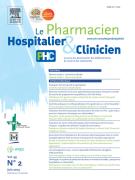Transition of care: A set of pharmaceutical interventions improves hospital discharge prescriptions from an internal medicine ward - 22/03/17
 , M. Dobrinas 1, S. Maurer 1, 2, D. Tagan 3, A. Sautebin 3, N. Widmer 1, A. Blanc 1
, M. Dobrinas 1, S. Maurer 1, 2, D. Tagan 3, A. Sautebin 3, N. Widmer 1, A. Blanc 1Résumé |
Background and objectives |
Continuity of care between hospitals and community pharmacies can be problematic and needs to be improved to ensure medication safety. Indeed, discrepancies that happen after hospital discharge can lead to adverse medical events increase the length of hospital stays or even lead to hospital readmissions.
Methods |
This 6 months study, including control and intervention groups, took place in the internal medicine ward of a Swiss hospital and in surrounding community pharmacies. Patients from the control group received usual care. The intervention group's patients underwent a set of pharmaceutical interventions during their hospital stay: medication reconciliation at admission; medication review during hospital stay; medication reconciliation at discharge and patient education on discharge prescriptions. The two groups were compared with regards to the number of community pharmacist interventions, the time spent on hospital discharge prescriptions and the number of treatment changes during transitional care.
Results |
This prospective interventional study included 118 patients, 64 in the control group and 54 in the intervention group. The mean number of community pharmacist interventions per patient was of 6.9 in the control group (n=439) and 1.6 in the intervention group (n=88): 77% fewer interventions than for the control group (P<0.0001). The time community pharmacists spent dealing with discharge prescriptions was significantly lower in the intervention group than the control group (P=0.0001). For instance, less than 10 minutes was spent with 14% (n=9) of patients in the control group, but with 63% (n=34) of patients in the intervention group. The mean number of interventions per patient requiring telephone calls to hospital physicians to clarify medication was of 4.8 in the control group and 1.2 in the intervention group: 75% fewer interventions than for the control group (P<0.0001). The mean number of medication changes between hospital admission and discharge was 10 per patient in the control group versus 6 in the intervention group (40% lower, P<0.0001). The mean number of medication changes between hospital discharge and community pharmacy care was 3 versus 1 (66% lower, P<0.0001) and between community pharmacy care and general practitioner care was 4 versus 3 (25% lower, P=0.002), for the control and intervention groups, respectively.
Discussion and conclusions |
Patients underwent significantly fewer medication changes in subsequent steps in the transition of care after a set of pharmaceutical interventions performed during their hospital stay. Community pharmacists had to perform fewer interventions on discharge prescriptions, thus improving continuity of care.
Le texte complet de cet article est disponible en PDF.Plan
Vol 52 - N° 1
P. e2-e3 - mars 2017 Retour au numéroBienvenue sur EM-consulte, la référence des professionnels de santé.
L’accès au texte intégral de cet article nécessite un abonnement.
Déjà abonné à cette revue ?

